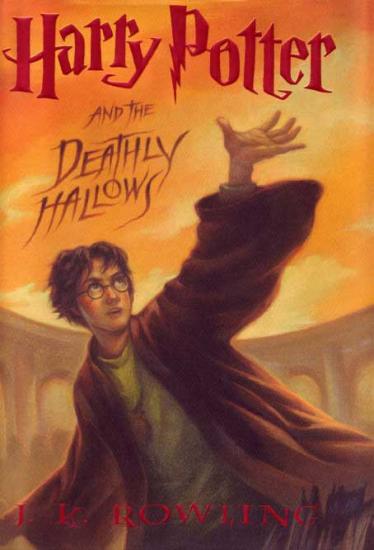
Series: Book 7 in the Harry Potter series
Rating: ****
Tags: Europe, Juvenile Fiction, School & Education, People & Places, Fantasy & Magic, Lang:en
Summary
Readers beware. The brilliant, breathtaking conclusion to
J.K. Rowling's
Harry Potter and the Deathly Hallows that no fan
will make it to the end unscathed. Luckily, Rowling has
prepped loyal readers for the end of her series by doling out
increasingly dark and dangerous tales of magic and mystery,
shot through with lessons about honor and contempt, love and
loss, and right and wrong. Fear not, you will find no
spoilers in our review--to tell the plot would ruin the
journey, and
Harry Potter and the Deathly Hallows is an odyssey
the likes of which Rowling's fans have not yet seen, and are
not likely to forget. But we would be remiss if we did not
offer one small suggestion before you embark on your final
adventure with Harry--bring plenty of tissues. The heart of Book 7 is a hero's mission--not just in
Harry's quest for the Horcruxes, but in his journey from boy
to man--and Harry faces more danger than that found in all
six books combined, from the direct threat of the Death
Eaters and you-know-who, to the subtle perils of losing faith
in himself. Attentive readers would do well to remember
Dumbledore's warning about making the choice between "what is
right and what is easy," and know that Rowling applies the
same difficult principle to the conclusion of her series.
While fans will find the answers to hotly speculated
questions about Dumbledore, Snape, and you-know-who, it is a
testament to Rowling's skill as a storyteller that even the
most astute and careful reader will be taken by surprise. A spectacular finish to a phenomenal series,
Harry Potter and the Deathly Hallows is a
bittersweet read for fans. The journey is hard, filled with
events both tragic and triumphant, the battlefield littered
with the bodies of the dearest and despised, but the final
chapter is as brilliant and blinding as a phoenix's flame,
and fans and skeptics alike will emerge from the confines of
the story with full but heavy hearts, giddy and grateful for
the experience.
--Daphne Durham
Visit the
Harry Potter Store
Begin at the Beginning
Harry Potter and the Sorcerer's Stone
Harry Potter and the Chamber of Secrets
Harry Potter and the Prisoner of Azkaban
Harry Potter and the Goblet of Fire
Harry Potter and the Order of the Phoenix
Harry Potter and the Half-Blood Prince
Why We Love Harry
Harry Potter and the Sorcerer's Stone
Harry Potter and the Chamber of Secrets
Harry Potter and the Prisoner of Azkaban
Harry Potter and the Goblet of Fire
Harry Potter and the Order of the Phoenix
Harry Potter and the Half-Blood Prince
Magic, Mystery, and Mayhem: A Conversation with
J.K. Rowling
--J.K. Rowling
Find out more about Harry's creator in
Did You Know?
A Few Words from Mary GrandPré
Starred Review. Potter fans, relax—this review
packs no spoilers. Instead, we're taking advantage of our
public platform to praise Rowling for the excellence of her
plotting. We can't think of anyone else who has sustained
such an intricate, endlessly inventive plot over seven thick
volumes and so constantly surprised us with twists, well-laid
traps and
Purloined Letter-style tricks.
Hallows continues the tradition, both with sly feats
of legerdemain and with several altogether new, unexpected
elements. Perhaps some of the surprises in
Hallows don't have quite the punch as those of
earlier books, but that may be because of the thoroughness
and consistency with which Rowling has created her magical
universe, and because we've so raptly absorbed its rules. We're also seizing the occasion to wish out loud that her
editors had done their jobs more actively. It's hard to
escape the notion that the first three volumes were more
carefully edited than the last four.
Hallows doesn't contain the extraneous scenes found
in, say,
Goblet of Fire, but the momentum is uneven. Rowling
is much better at comedy than at fight scenes, and no reader
of the sixth book will be startled to hear that
Hallows has little humor or that its characters
engage in more than a few fights. Surely her editors could
have helped her find other methods of building suspense
besides the use of ellipses and dashes? And craft fight
dialogue that sounds a bit less like it belongs in a comic
book? Okay, we're quibbling. We know these minor nuisances
won't dent readers' enjoyment, at least not this generation
of readers; we couldn't put
Hallows down ourselves. But we believe Rowling, and
future readers, deserved even better. Ages 9-12.
(July)
Amazon.com Review
Harry, including books, audio CDs and cassettes,
DVDs, soundtracks, games, and more.
Favorite Moments from the Series
There are plenty of reasons to love Rowling's wildly
popular series--no doubt you have several dozen of your own.
Our list features favorite moments, characters, and artifacts
from the first five books. Keep in mind that this list is by
no means exhaustive (what we love about Harry could fill ten
books!) and does not include any of the spectacular
revelatory moments that would spoil the books for those (few)
who have not read them. Enjoy.
From Publishers Weekly
Copyright © Reed Business Information, a division
of Reed Elsevier Inc. All rights reserved.